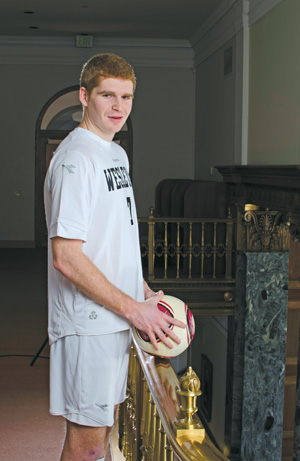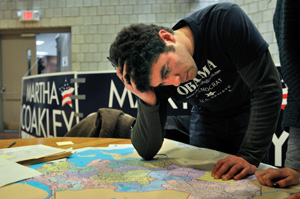ARGUS OPINION PIECE SPARKS CONTROVERSY
This fall, Wesleyan students found themselves embroiled in a debate that touched on issues of race, oppression, and freedom of speech, and which generated significant national attention.
Fierce at times, the debate also has produced an ongoing exploration of social justice issues facilitated by Wesleyan’s Office of Student Activities and Leadership Development.
On September 14, Bryan Stascavage ’18, a Posse veteran scholar who served in Iraq, wrote an opinion column in The Wesleyan Argus titled, “Why Black Lives Matter Isn’t What You Think.” Stascavage pens a regular column in the Argus, which frequently tackles controversial issues, but even he was surprised by the response to this piece. In it, Stascavage questioned whether the Black Lives Matter movement is creating conditions that lead mentally disturbed individuals to violent acts such as killing police officers. Stressing that he supports the efforts of moderate activists, he wrote: “If vilification and denigration of the police force continues to be a significant portion of Black Lives Matter’s message, then I will not support the movement.”
The column quickly inspired a wave of online comments, as well as opposing op-eds and letters published in the newspaper’s subsequent issues. Many of those responding were deeply upset by Stascavage’s criticisms of the Black Lives Matter movement.
Within a week, a student group submitted a petition, signed by more than 150 students, alumni, and staff, to the Wesleyan Student Assembly calling for a boycott of the Argus and revocation of its student group funding unless demands were met. While Stascavage’s column was the spark for this protest, the petition contends that the Argus has long neglected “to provide a safe space for the voices of students of color and we are doubtful that it will in the future.” As part of the boycott, stacks of the Argus were dropped into recycling bins around campus (and many were subsequently rescued by Argus supporters).
The Argus editors issued a front page editorial apologizing “for the distress the piece caused the student body” and promising to take steps “toward making the newspaper a safe space for the student of color community.” However, the editors insisted on maintaining editorial independence.
President Michael Roth, Provost Joyce Jacobsen, and Vice President for Equity and Inclusion Antonio Farias responded to the campus controversy with a letter to the Argus and blog post titled, “Black Lives Matter and So Does Free Speech.” They wrote, “Debates can raise intense emotions, but that doesn’t mean that we should demand ideological conformity because people are made uncomfortable. As members of a university community, we always have the right to respond with our own opinions, but there is no right not to be offended.”
Then, in October, the Wesleyan Student Assembly unanimously passed a resolution that would redistribute funding to the Argus and other student publications on campus. The specifics will be studied by a working group through fall 2016, but if the plan is enacted, it would cut the Argus’ printing budget dramatically, and allocate the money to create stipend writer positions at all student publications and allowances for digital innovation. The resolution’s backers maintain it is intended to increase readership of student publications, distribute resources more equitably, and reduce paper waste, but critics (including many outside campus) denounce it as unjust punishment of the Argus for publishing an unpopular opinion piece.
The controversy on campus has provoked a flurry of coverage in the national news media, with both conservative and mainstream outlets publishing over 200 articles on the topic. Stascavage was interviewed on Fox News, CNN and The Huffington Post. Organizations such as the National Coalition Against Censorship, the Student Press Law Center, and the Society of Professional Journalists, as well as numerous newspaper editorial boards, decried the actions of those boycotting the Argus as an attack on free speech.
Yet others argued that this was not a matter of free speech at all. A letter posted on the unofficial campus news blog Wesleying and signed by an anonymous “Group of Concerned and Unapologetic Students of Color” argued that framing the issue as one of free speech, without the context of historically censored voices, is yet another instance of systemic racism. The group stated: “Let us be clear: this is not an issue of your free speech. This is an issue of our voices being silenced, our communities under attack.”
And Tedra James ’18, writing in the Argus, explained, “When faced with this article [by Stascavage] that reeked of racism between its lines, I, and others who organized and shared that pain with me, did not feel that anything but a boycott would work. Here’s why: A boycott is a refusal to support an institution. Those who cried, ‘Well why don’t you just write a response?’ missed that the entire point was trying to change the Argus at its core.” In its mission the Argus claims it is a student publication, she said, adding: “Students of color are students too. If there is no meaningful representation, then you are not fulfilling your mission.”
The debate on campus has at times turned heated. Some students felt hurt and angry by the original op-ed, while Stascavage said he has been called a racist and yelled at while out in public. Yet for many students, it’s been a moment to learn from others, and question their own behavior and place in the world. At the request of the WSA leadership, Wesleyan’s Office of Student Activities and Leadership Development is facilitating open discussions and social justice training for all students who are interested in exploring these issues in a respectful and productive way. Wesleyan also convened a larger discussion on these issues by, for the first time, opening its annual Social Justice Leadership Conference this fall to students from across the state.
The programming so far has been focused on the topic of self-awareness, particularly how privileged identities and past experiences shape perceptions. “We are helping students explore how their own actions can either maintain systems of oppression or produce positive change,” said Elisa Cardona, director of Student Activities and Leadership Development. “Each session closed with every student committing to one action item to remind them that social justice work is about action.”
“While conversations like this can be painful, they’re exactly the types of discussions students should be having during their time at Wesleyan,” said Roth. “Our students learn to examine issues from many different points of view—even those they might find objectionable. This is a critical component of liberal education and an essential skill to empower students to deal with difficult issues they will face at work and in life in the future.”



